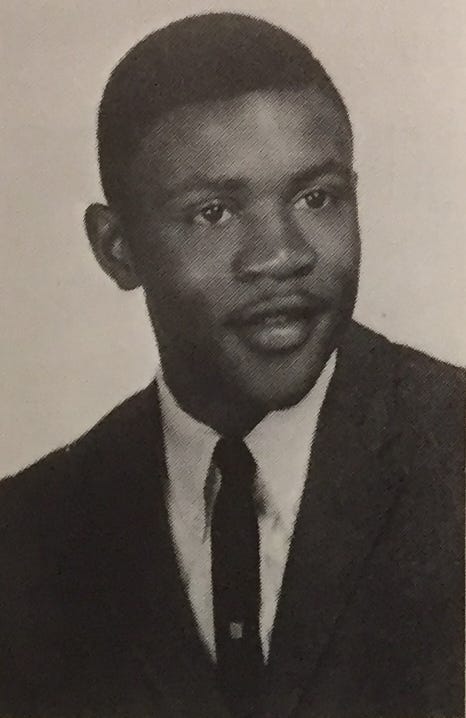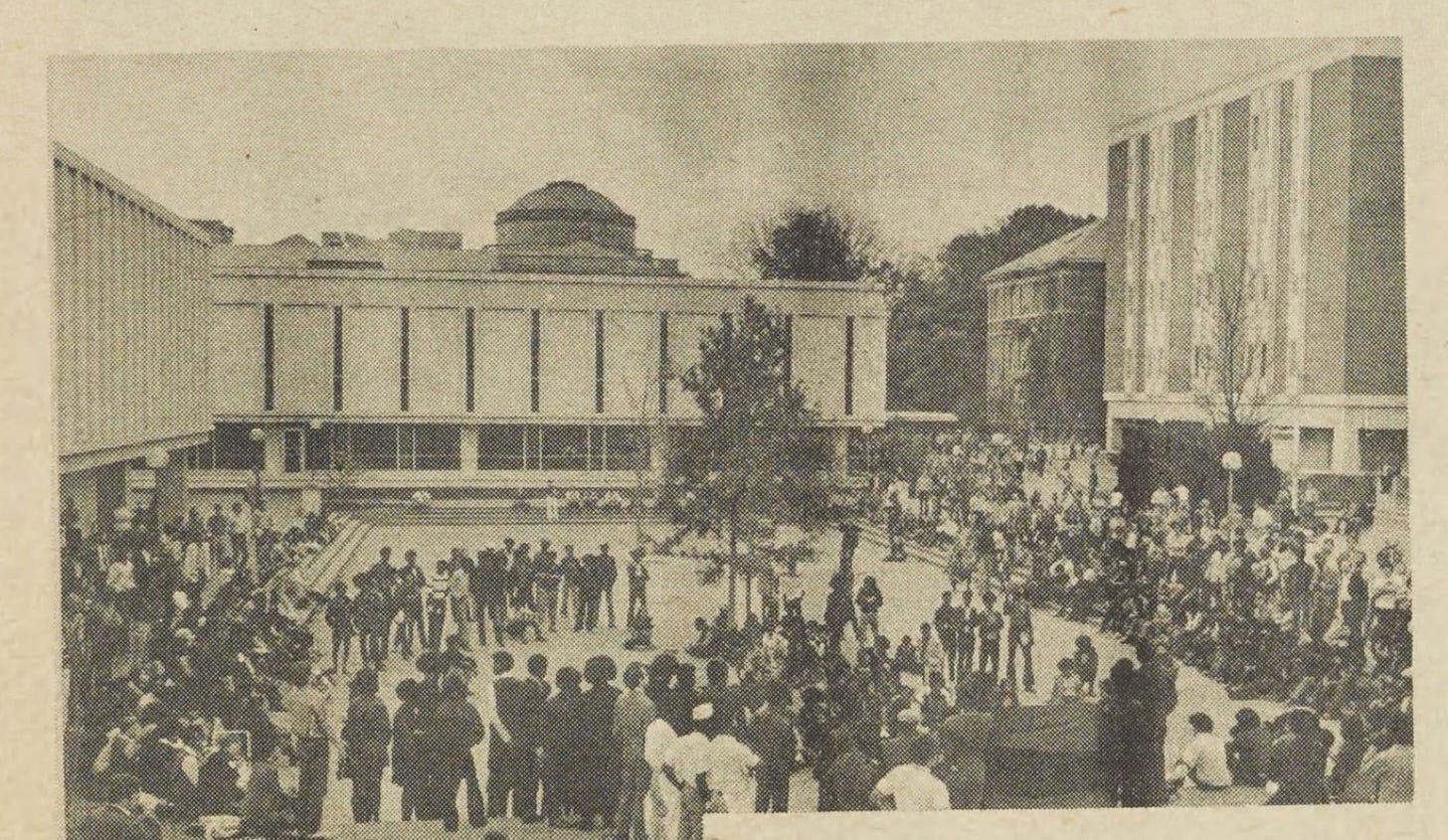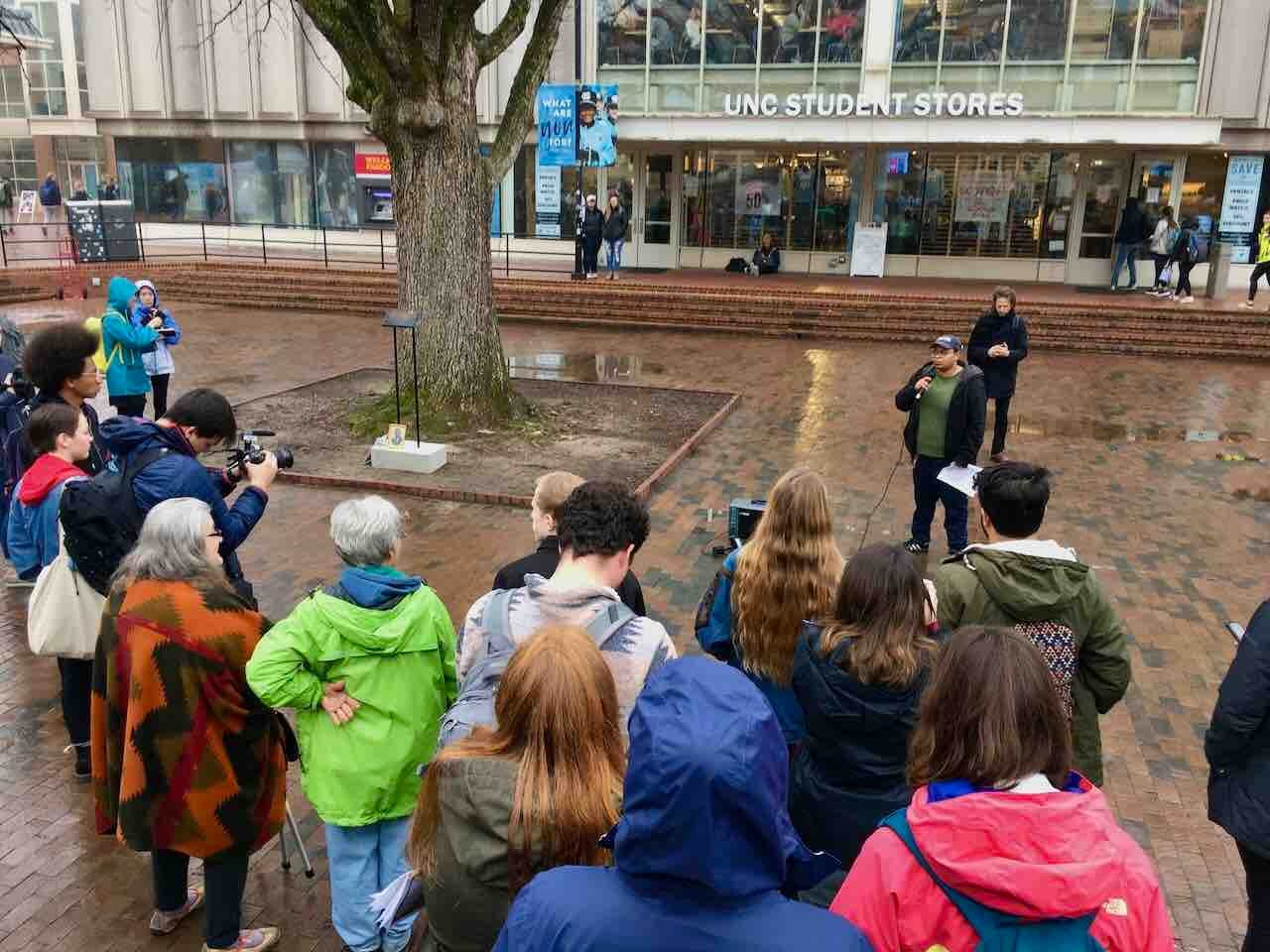IN THE MIDST of an ongoing U.S. Department of Justice cold case investigation into the circumstances surrounding the 1970 murder of James L. Cates Jr., UNC has now announced plans to permanently memorialize James Cates on its landscape.
On Friday, Chancellor Kevin Guskiewicz released a statement about the James Cates Memorial, which will be installed by the Pit later this year. The UNC Board of Trustees approved the plan late last month, evidently in closed session. Mr. Cates was killed in an act of racial violence outside the Student Union while attending a dance in the Union. He was 22 at the time of his death.
In response to the news of the memorial, the family of James Cates — represented by his sister Mary Lee Campbell and cousins Nate Davis and Valerie Foushee — has provided to Stone Walls the following statement:
We were pleased to hear that the university is planning to recognize our beloved brother and cousin James Lewis Cates Jr. with a memorial. Similar to our sentiments about the cold case investigation that the U.S. Department of Justice opened this year, we are grateful for this development while also acknowledging our heartbreak that it has taken more than fifty years to get here.
As we contemplate the promise a memorial brings that James Cates’s life will not be forgotten, we think of his mother, Eula, and his grandmother, Mrs. Annie Cates (a long-time UNC employee), who transitioned before this acknowledgment and proposed recognition.
Thank you to the many UNC students and community members who pushed to make this happen. We look forward to the day when the proposed memorial is installed and dedicated.
Mary Lee Campbell
Nate Davis
Valerie Foushee
Outside of the local Black community, this tragic murder had largely been forgotten until recent years. Now 52 years later, in a six-month span the United States Department of Justice has launched a cold case investigation and the University of North Carolina at Chapel Hill has announced it will install a permanent memorial in the center of campus.
The move by the university comes after years of advocacy by the family of Mr. Cates, his friends, their community, UNC students and multiple campus groups, and the James Cates Remembrance Coalition.
In June of last year, the family called on UNC to rename the Student Stores building for James Cates in an essay for The Assembly, and the James Cates Remembrance Coalition published a scholarly proposal to bolster the idea. (The building was originally named in 1968 for white supremacist Josephus Daniels and was stripped of that name in 2020.) The Cates Building proposal received endorsements (listed at the document’s end) from 17 groups or organizations and more than 175 individuals, including the Board of Orange County Commissioners, the Carrboro Town Council, most of the Chapel Hill Town Council, and the mayors of Chapel Hill, Carrboro, and Hillsborough. The Student Stores building, also next to the Pit, has yet to be renamed.
As calls for Cates Building grew louder, the UNC Black Student Movement and other campus groups were proposing a permanent campus memorial, which was also supported by the family. As the Nikole Hannah-Jones tenure controversy erupted last summer, the Black Student Movement announced a set of demands for the university. At the top of BSM’s list was a permanent monument for James Cates. The Black Student Movement, Carolina Black Caucus, and Black Graduate and Professional Student Association also released a consolidated list of priorities that included a permanent memorial for James Cates.
Several of those issues were addressed in Hannah-Jones’s settlement with UNC that was announced last month.


A Cates memorial was not covered in the settlement, but now the university has agreed to move forward with a James Cates Memorial as well.
James Cates has been referred to as the Emmett Till of Chapel Hill, yet his story had been whitewashed from local history despite, or rather because of, the circumstances — that police were on the scene yet let him bleed on the ground for an egregiously long time, that no attempt was made at the scene to make arrests or question witnesses or collect evidence, that university employees washed the crime scene without investigation, that an all-white jury found three white bikers not guilty, and that marches and firebombings followed.

For a few years after the murder, the Black Student Movement marked the anniversary with events on campus, including a vigil at the Confederate monument and the Pit with Cates’s family. Nearly a half-century later, campus activist Emil Little called for a monument to James Cates in a speech the night in 2018 when the Confederate monument would fall, and one of the banners that activists surrounded Silent Sam with displayed the name James Cates among many others. In 2019, campus activists installed a memorial plaque for James Cates in the Pit that the university promptly removed. In 2020, Cates’s family, friends, and community marked the 50th anniversary with a remembrance walk
The James Cates Remembrance Coalition, which is guided by the family, then announced it would embark on a longterm effort to document and preserve the history surrounding James Cates. This spring and summer, the Coalition, which I am a part of, conducted its Critical Oral History sessions to further record the context of this tragic racial murder. Critical Oral History is a process of recording history that centers people most directly impacted by an event. Mr. Cates’s family and friends have been intimately involved in that process for the last two years. Danita Mason-Hogans, a seventh-generation Chapel Hillian and an organizer of the Coalition, helped develop Critical Oral History methodologies at Duke’s Center for Documentary Studies.
UNC’s Center for the Study of the American South and the Chapel Hill Public Library have also been instrumental to and greatly supportive of the Coalition’s work. The James Cates Scholars, middle and high school students studying local history and storytelling in a summer program with Ms. Mason-Hogans, held a showcase of their work at the library this week.
Now James Cates will rightfully and permanently be memorialized on the campus landscape.
For more information about James Cates:
The James Cates Remembrance Coalition’s proposal to name the UNC Student Stores building for him, endorsed by many dozens of community members, local leaders, and organizations.
A webinar on James Cates featuring his family and friends
An essay for The Assembly by Nate Davis and Valerie P. Foushee advocating for James Cates Building, titled, “Say His Name: James Cates”
“Re/Collecting Chapel Hill” podcast episode about James Cates
Video of the 50th anniversary Community Remembrance Walk
Stone Walls at the 50th anniversary, on James Cates’s life and community
Twitter thread about the circumstances of his death







